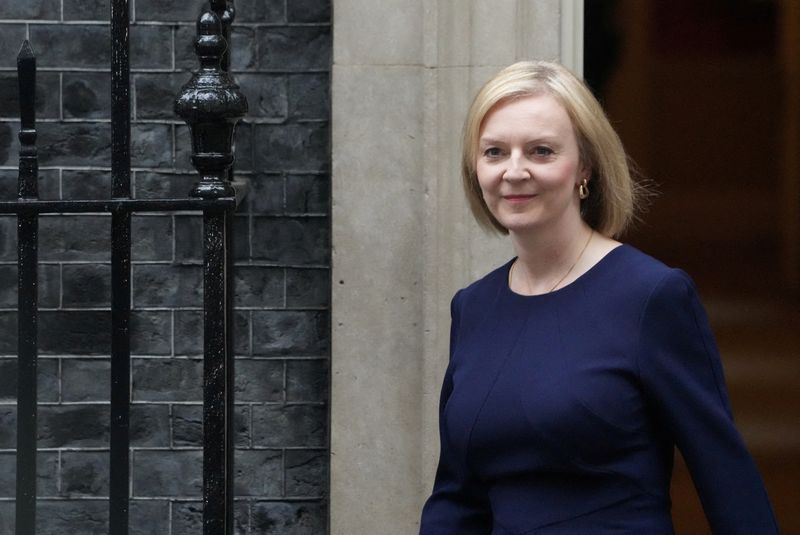UK’s Truss breaks silence on markets slump, defends her tax cuts
2022.09.29 04:38
[ad_1]

© Reuters. FILE PHOTO: Britain’s Prime Minister Liz Truss walks outside Downing Street in London, Britain, September 23, 2022. REUTERS/Maja Smiejkowska/
By Muvija M and Kate Holton
LONDON (Reuters) – British Prime Minister Liz Truss broke her silence on Thursday following nearly a week of chaos in financial markets triggered by her plans for tax cuts, saying she was willing to take “controversial” decisions to reignite growth.
A day after the Bank of England revived its bond-buying programme in an emergency move to protect pension funds from a potential partial collapse, Truss blamed the upheaval on Russia’s invasion of Ukraine which has caused inflation to spike around the world.
“We had to take urgent action to get our economy growing, get Britain moving, and also deal with inflation, and of course, that means taking controversial and difficult decisions,” she said in a series of interviews with local BBC radio stations.
“But I’m prepared to do that as prime minister because what’s important to me is that we get our economy moving.”
Truss became prime minister on Sept. 6 after winning the leadership of the governing Conservative Party with promises to cut taxes.
British government bond yields, which surged after her finance minister Kwasi Kwarteng laid out their fiscal plan on Friday, rose again in early trade on Thursday, reversing some of Wednesday’s plunge when the BoE announced its emergency move. [GB/]
Sterling was down about 1% against the U.S. dollar, taking its fall in September to more than 7%, almost twice the fall for the euro against the dollar.
“This is the right plan that we’ve set out,” Truss said, adding it would put Britain’s economy on a better trajectory for the long term.
Asked during one interview if it was time to reverse the mini-budget, Truss said: “No, it isn’t because … the majority of the package we announced on Friday was the support on energy for individuals and businesses and I think that was absolutely the right thing to do.”
DRAMATIC MOVES
Investors, businesses and consumers are now waiting for the government to announce more details of how it plans to get the economy growing more quickly, which will be key to fixing Britain’s increasingly stretched public finances.
“Every day, every week, every month, the government will now be critiqued by markets and businesses on how serious they are about growth and about their fiscal responsibility to pay back debt,” Tony Danker, director-general of the Confederation of British Industry, said late on Wednesday.
Former BoE governor Mark Carney criticized the plan to cut taxes, saying it had undercut efforts by the British central bank to curb inflation and sowed the chaos in financial markets.
“Unfortunately having a partial budget, in these circumstances – tough global economy, tough financial market position, working at cross-purposes with the Bank – has led to quite dramatic moves in financial markets as we have all seen,” Carney told the BBC.
Kwarteng’s deputy Chris Philp said the government would stick to its plan to hold a fuller fiscal announcement on Nov. 23, when it will set out further details on how it will cut debt.
Some financial analysts have said the government might have to bring forward that announcement to settle the nerves of investors.
[ad_2]
Source link








